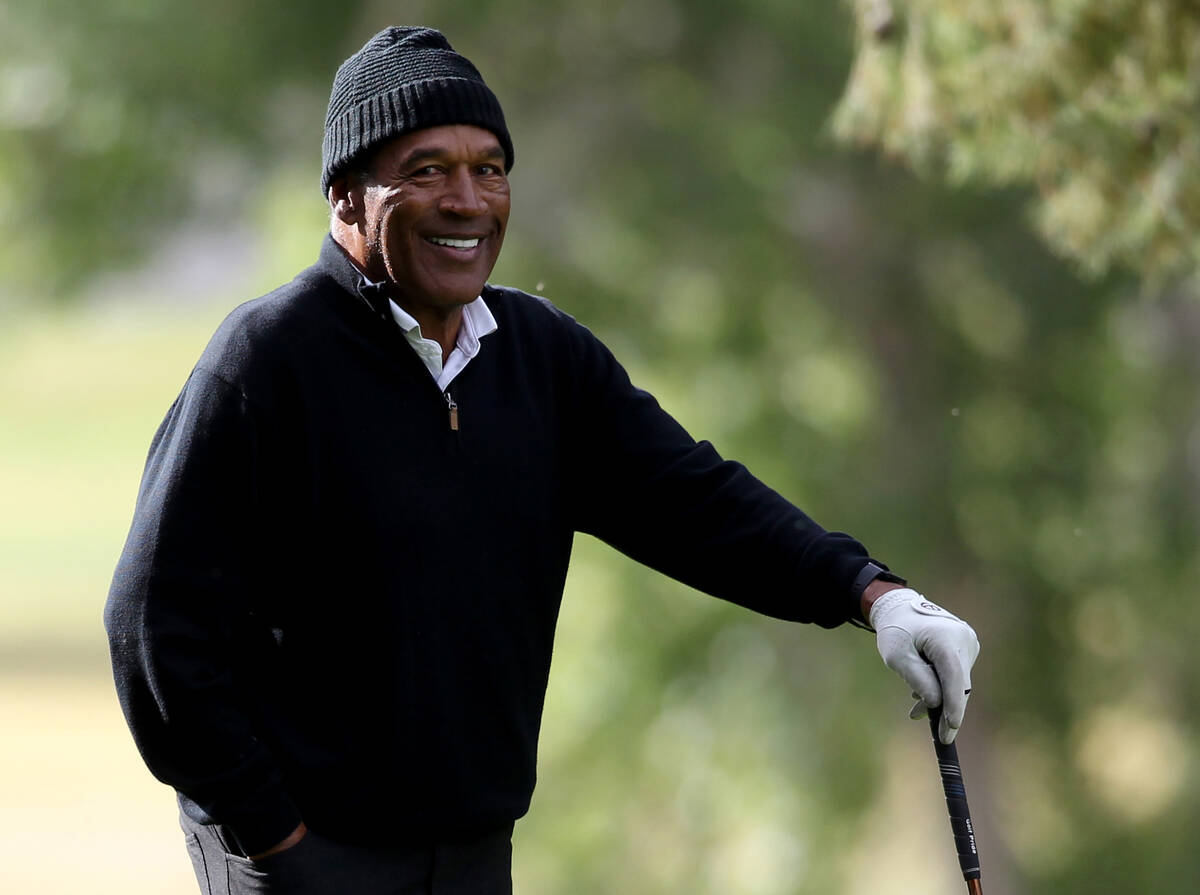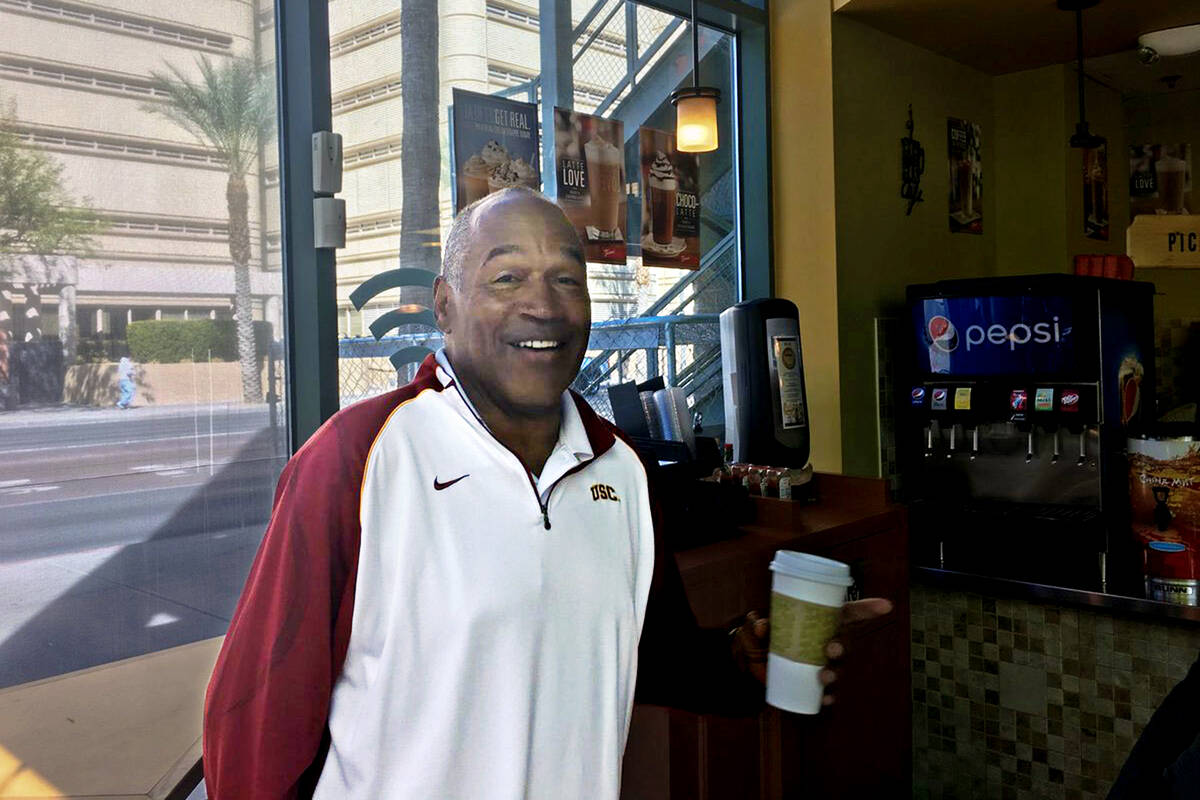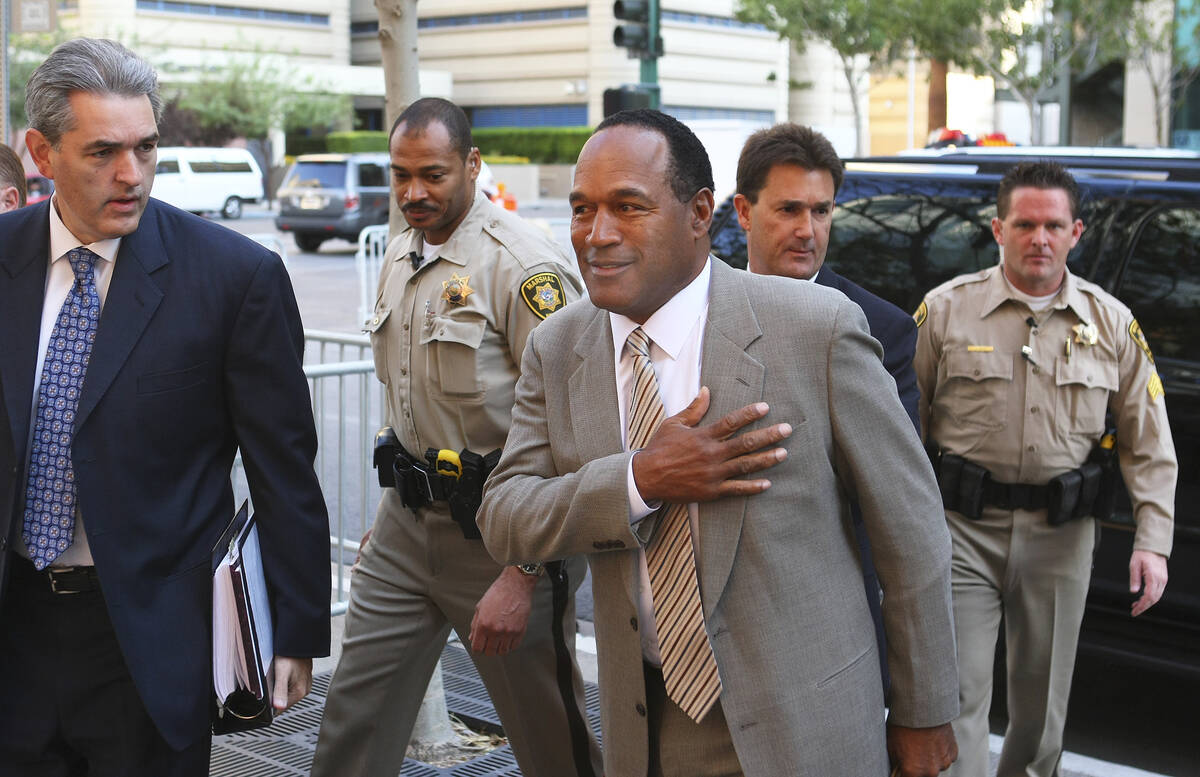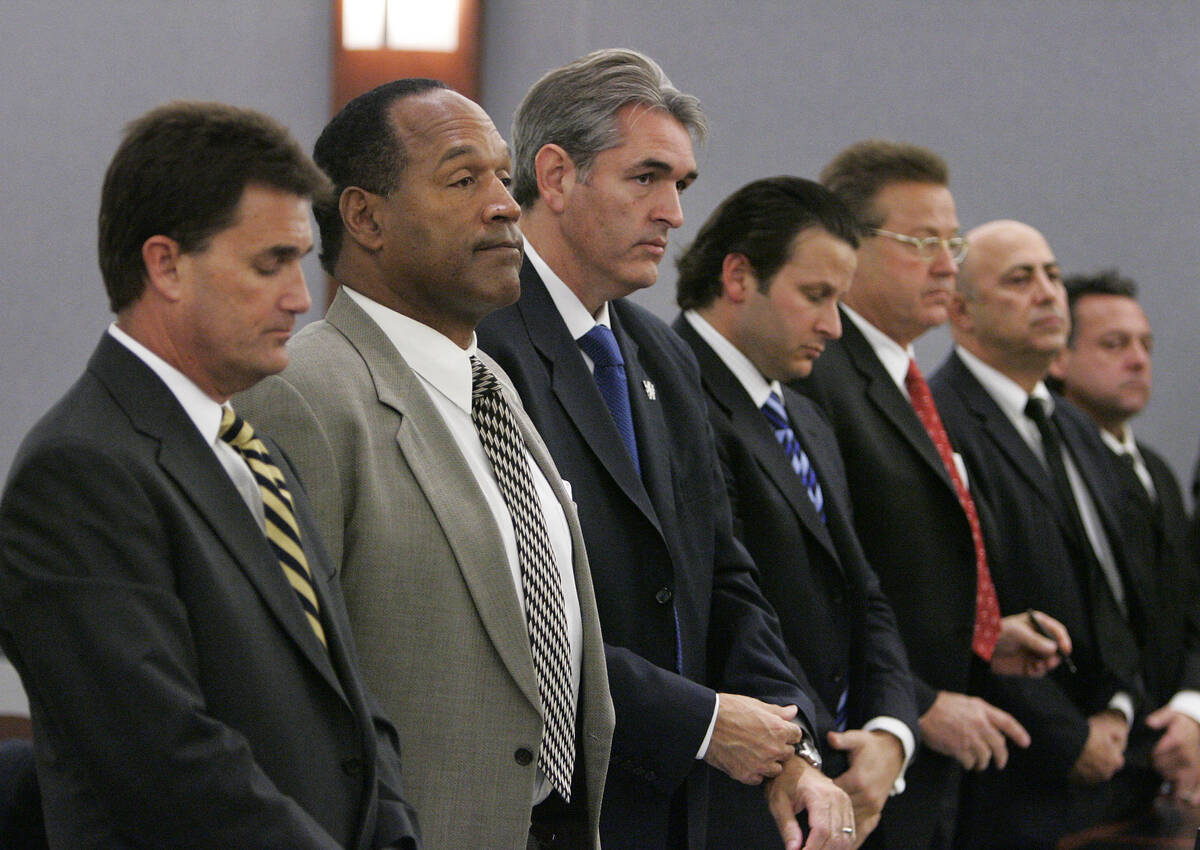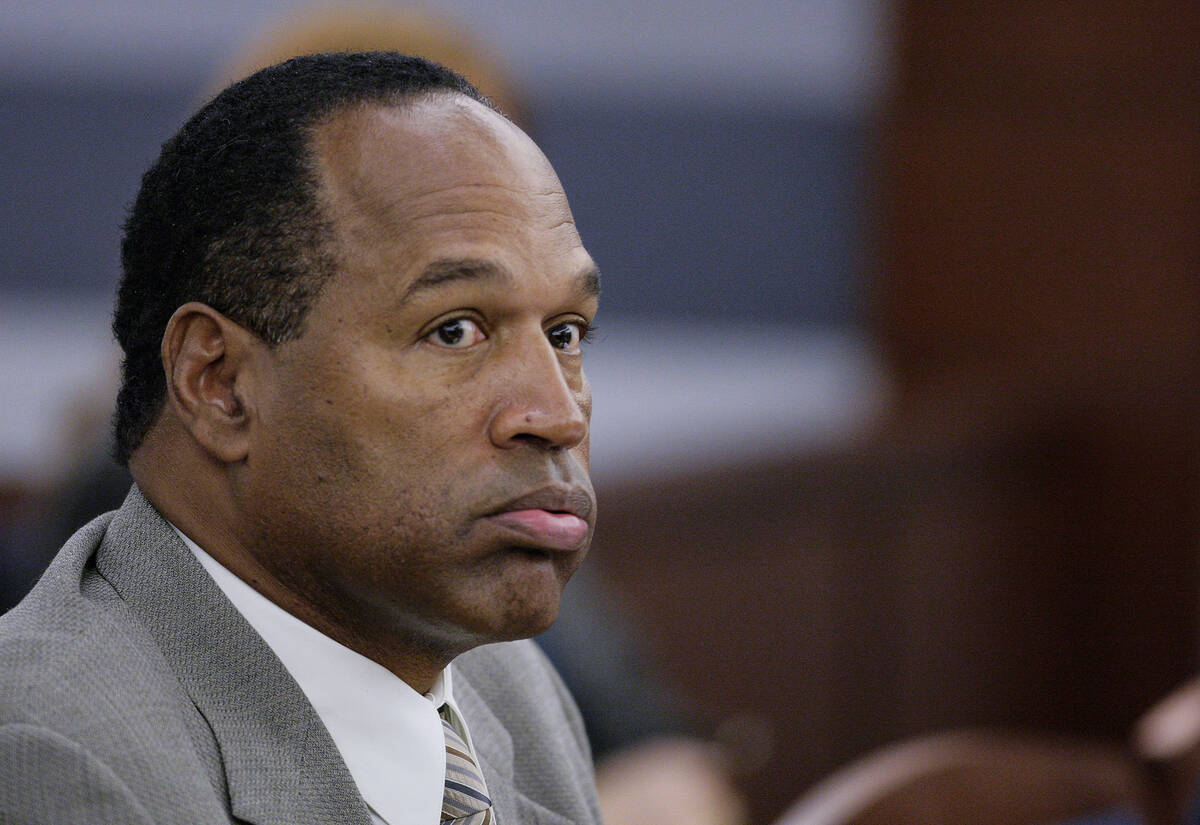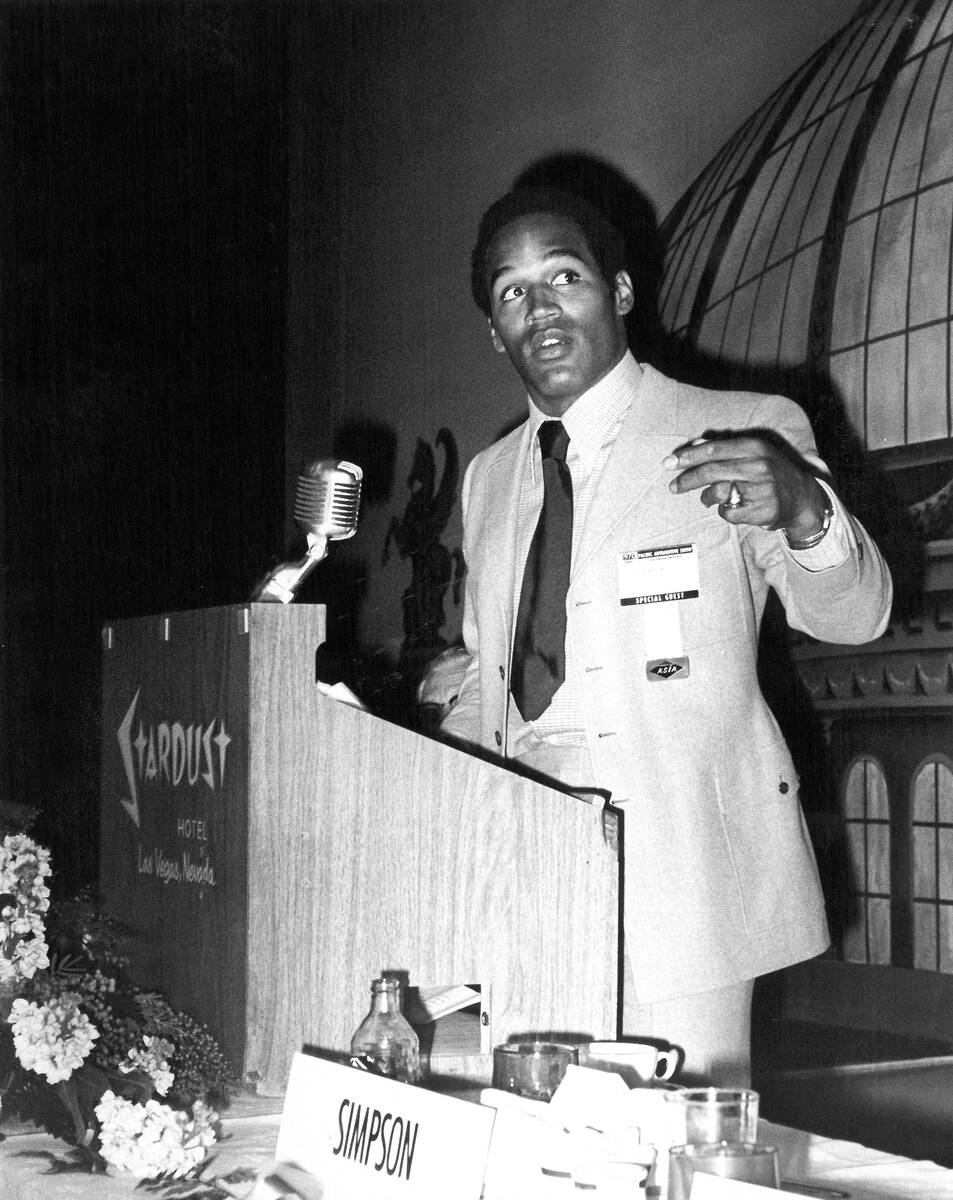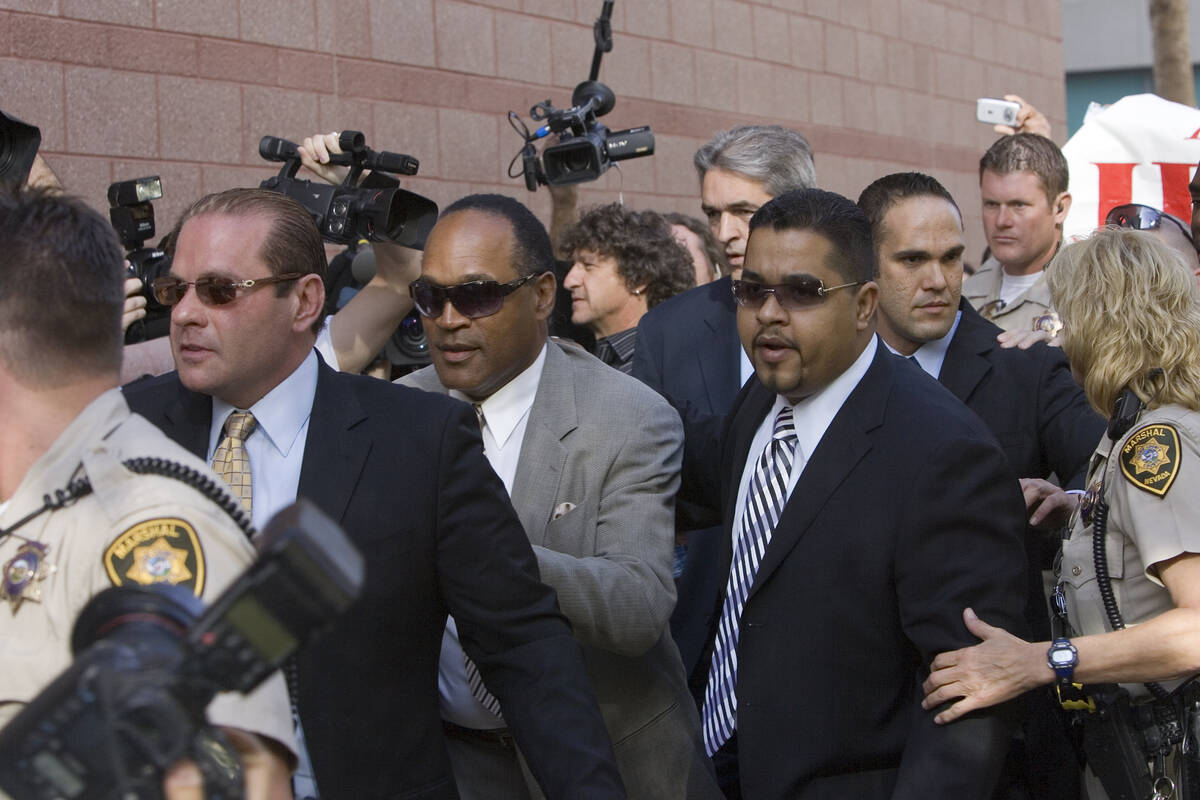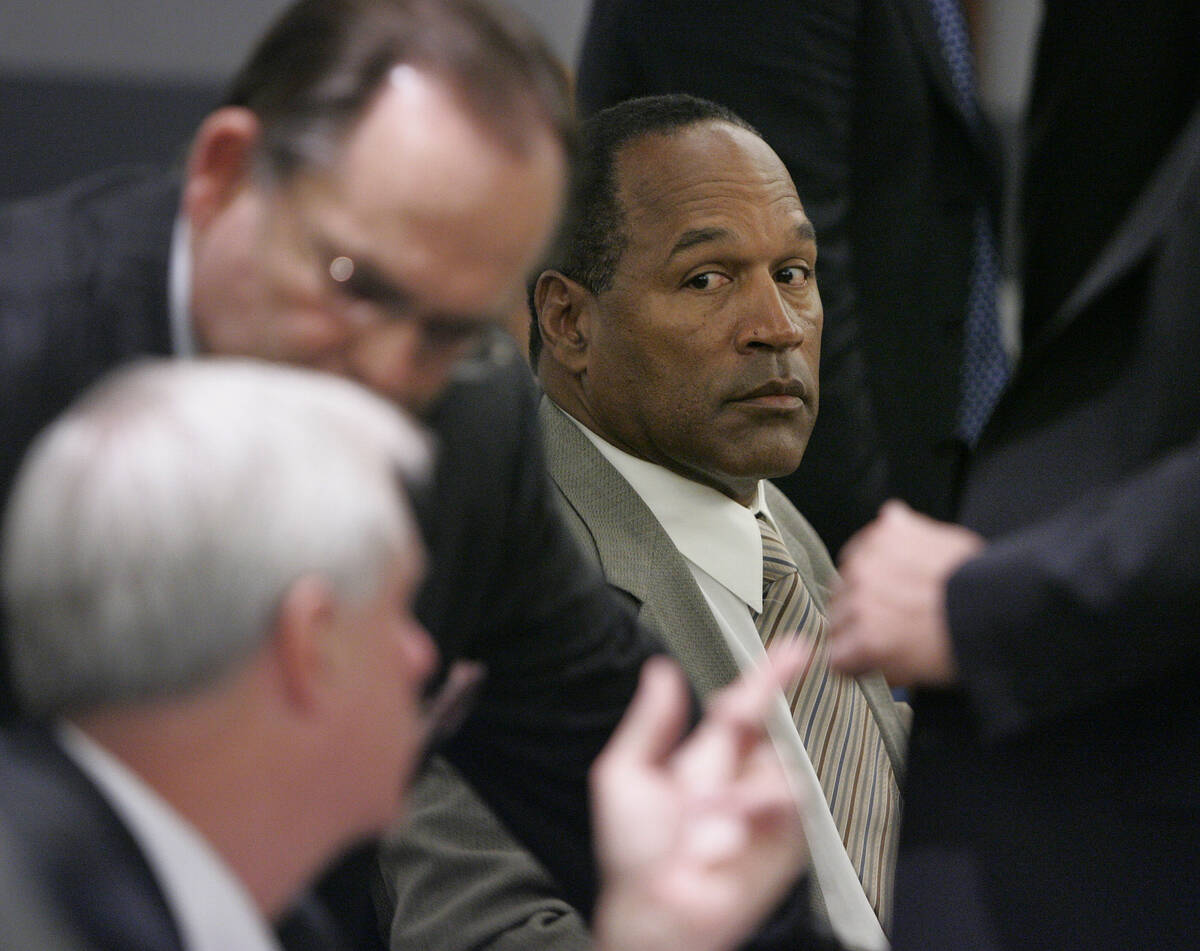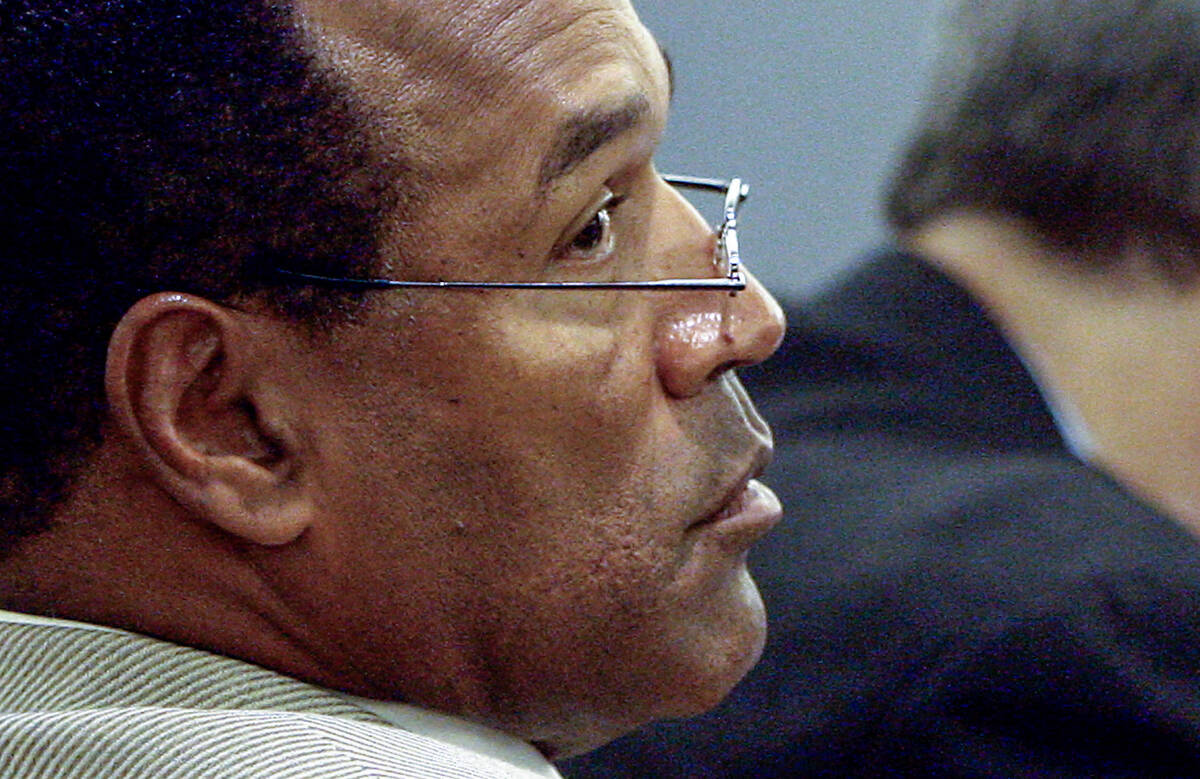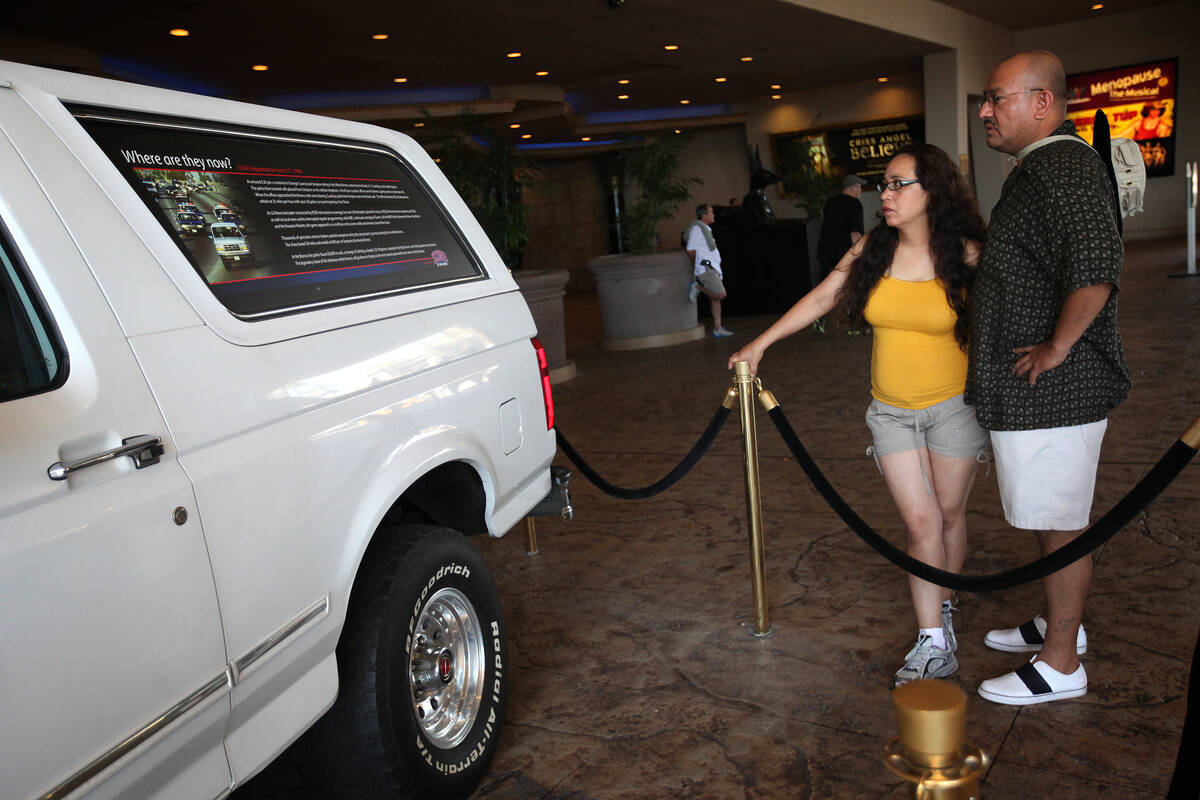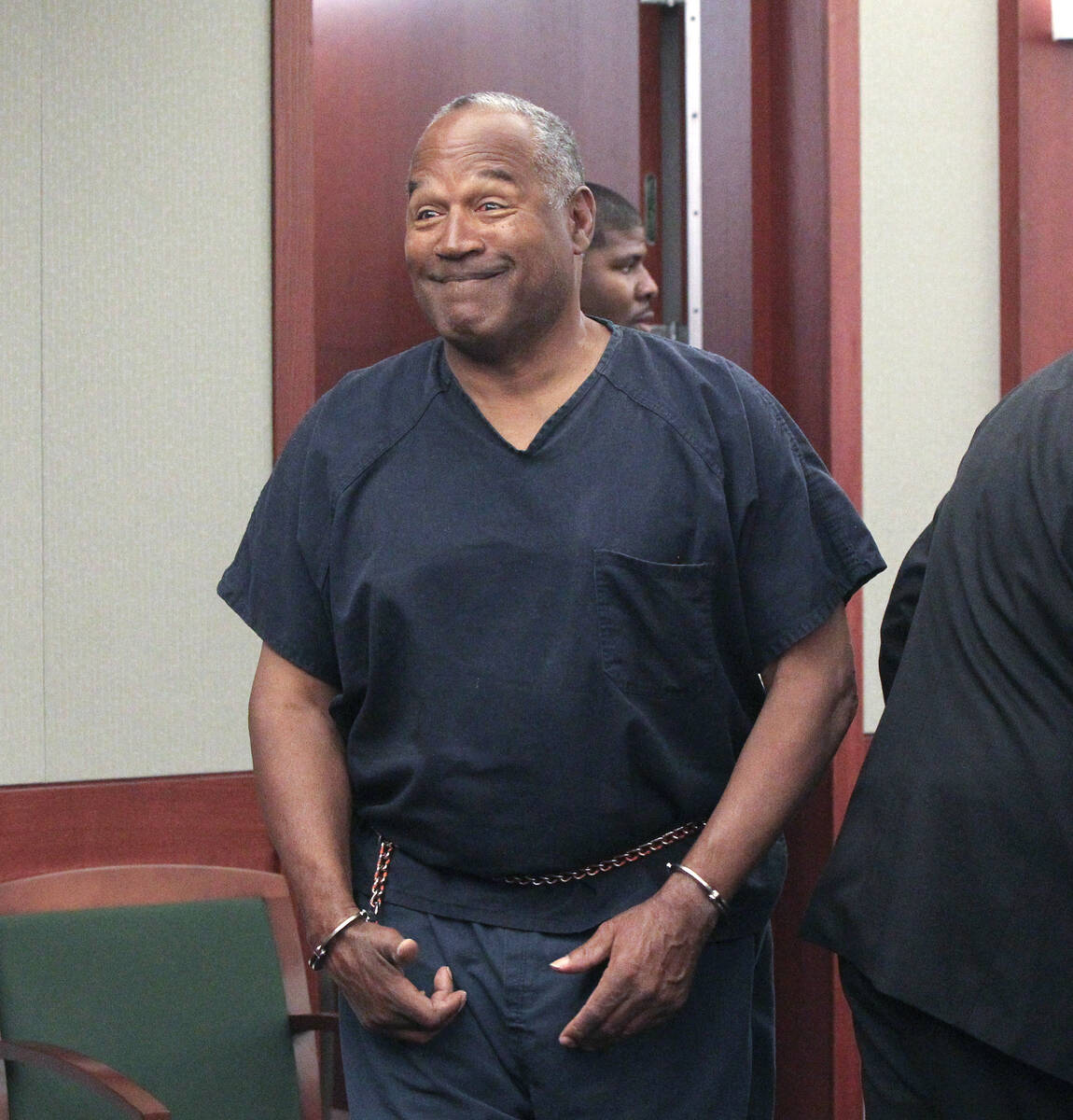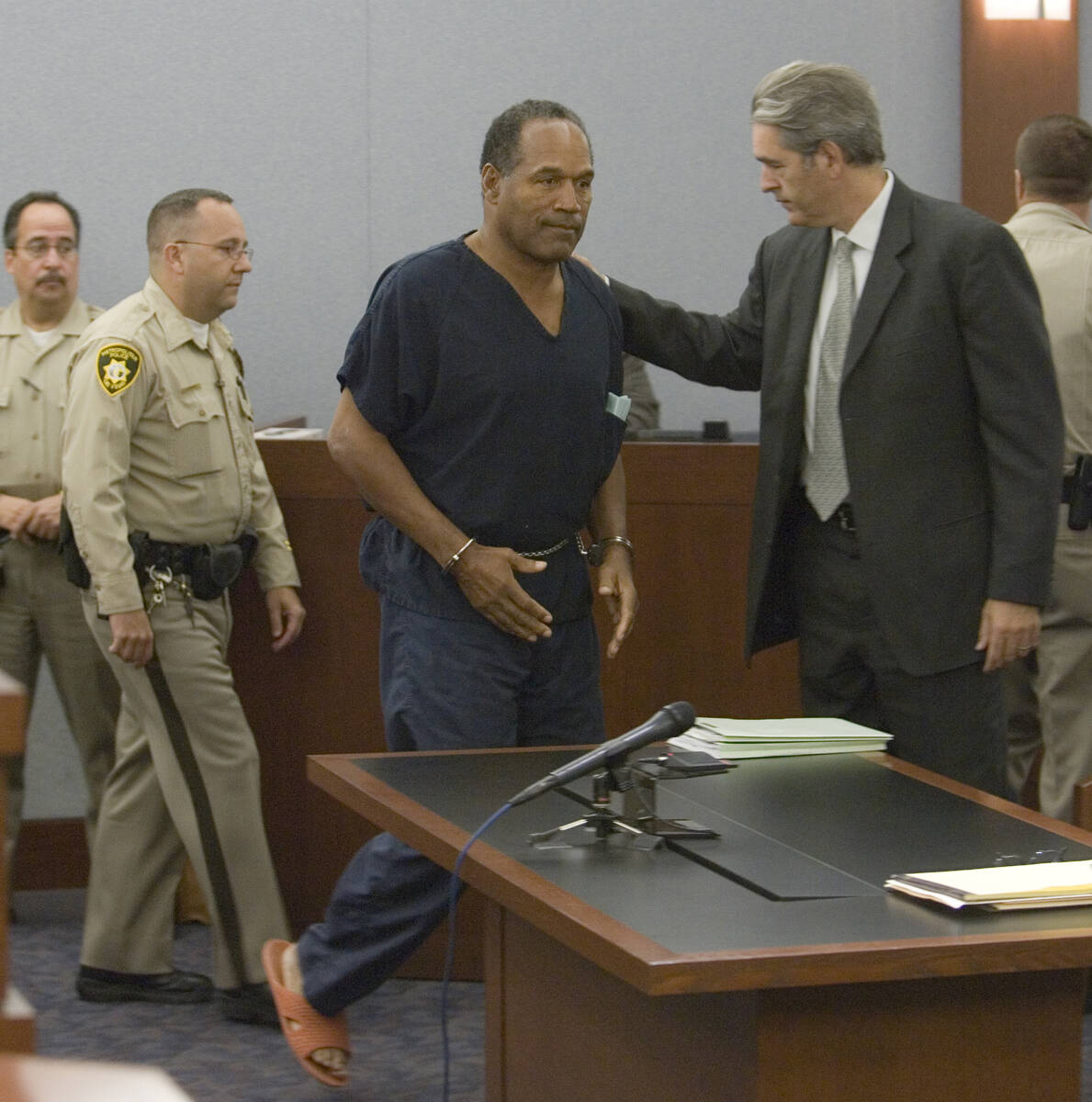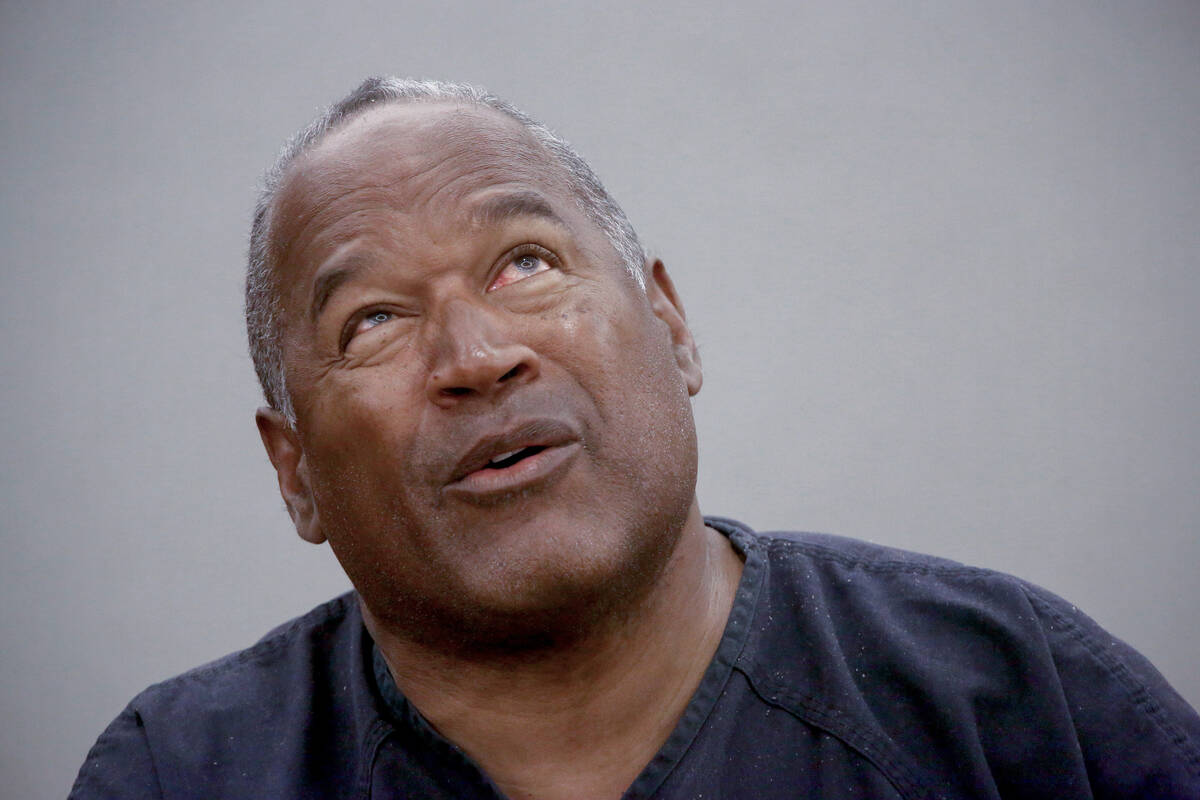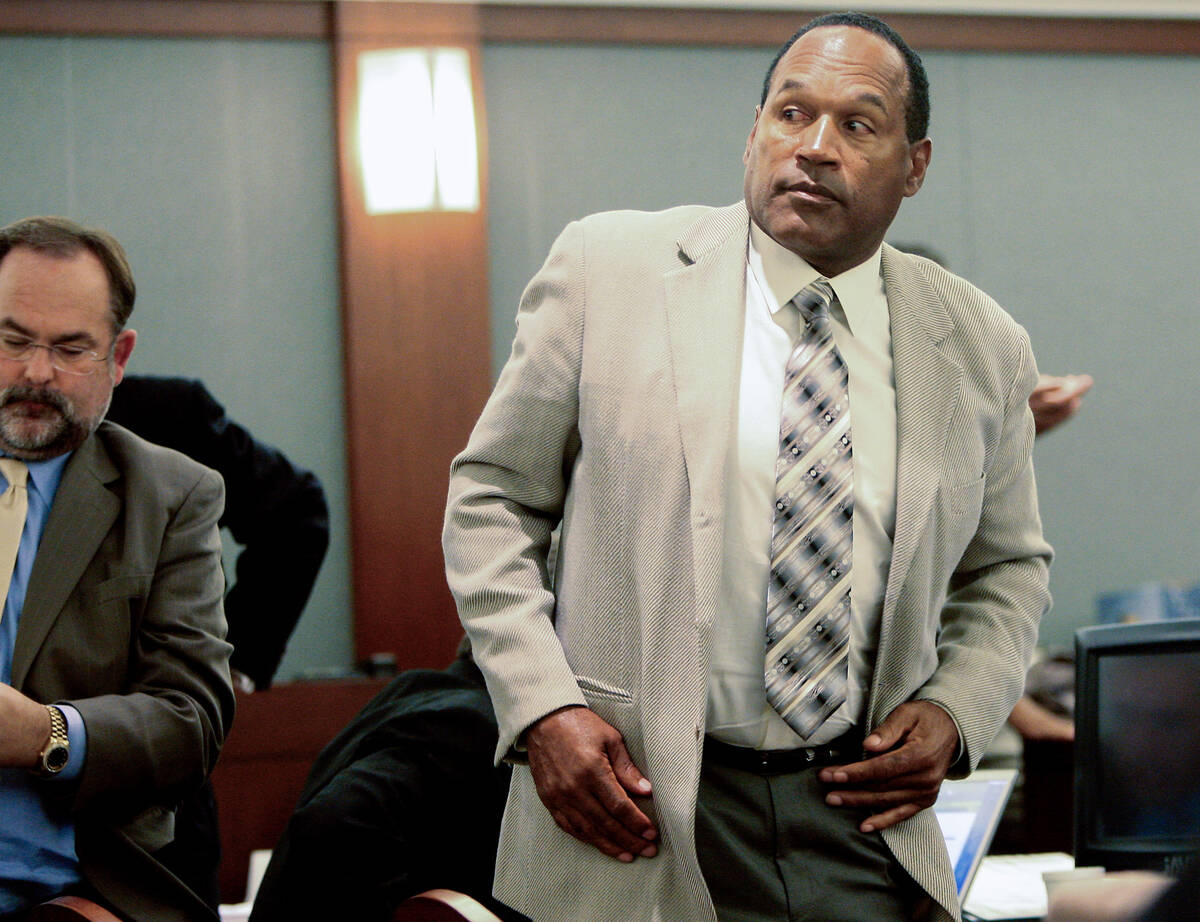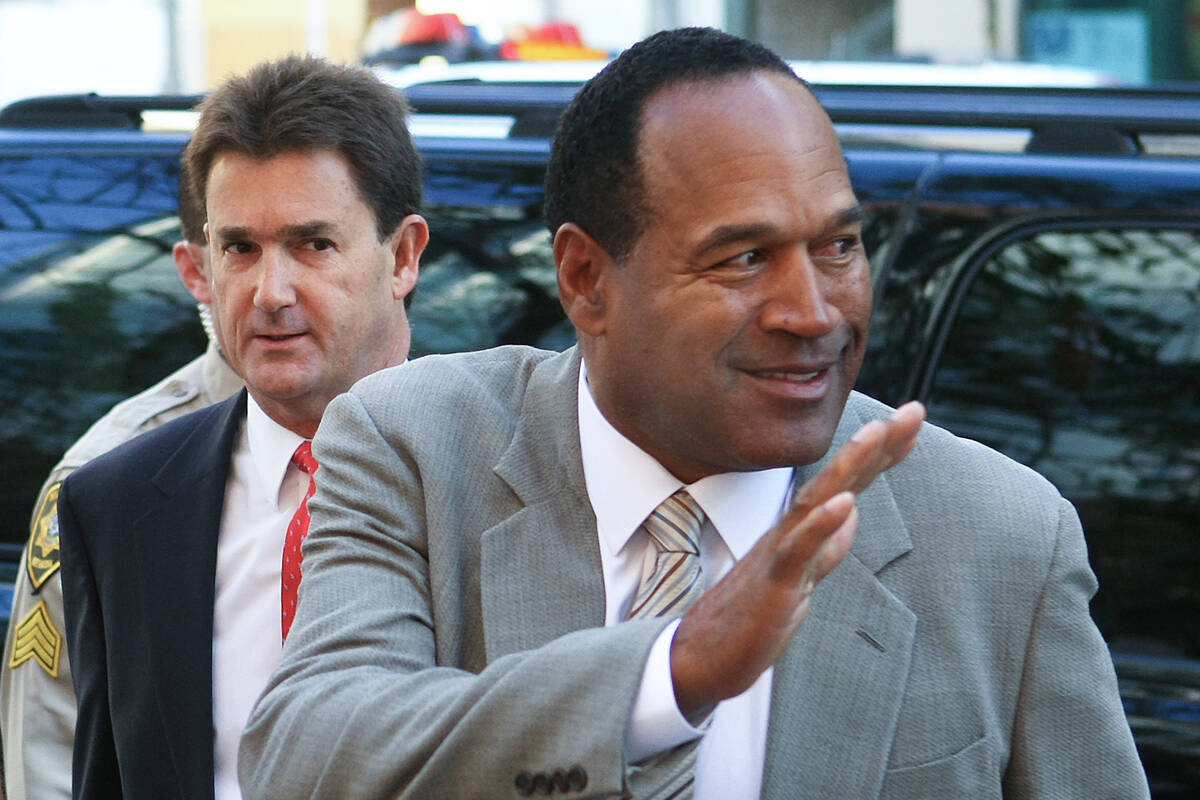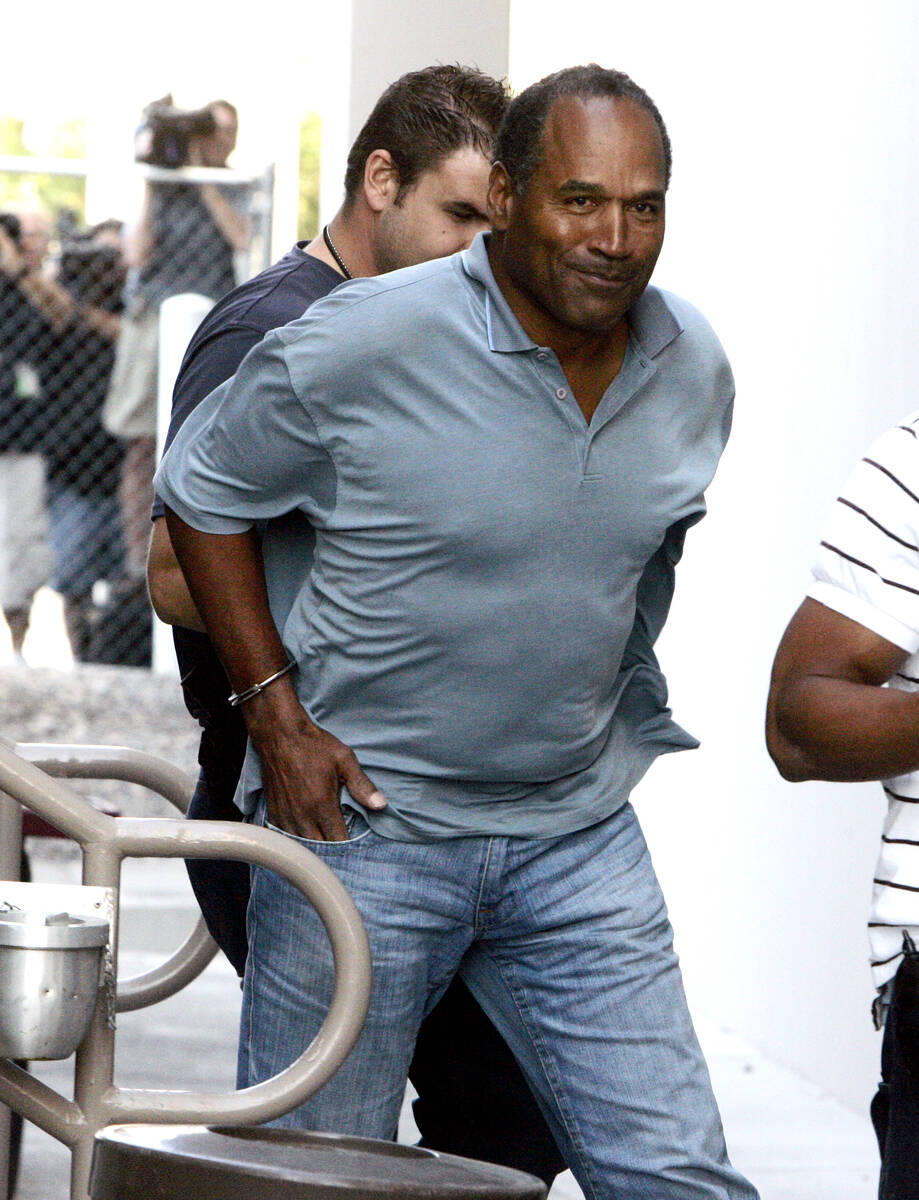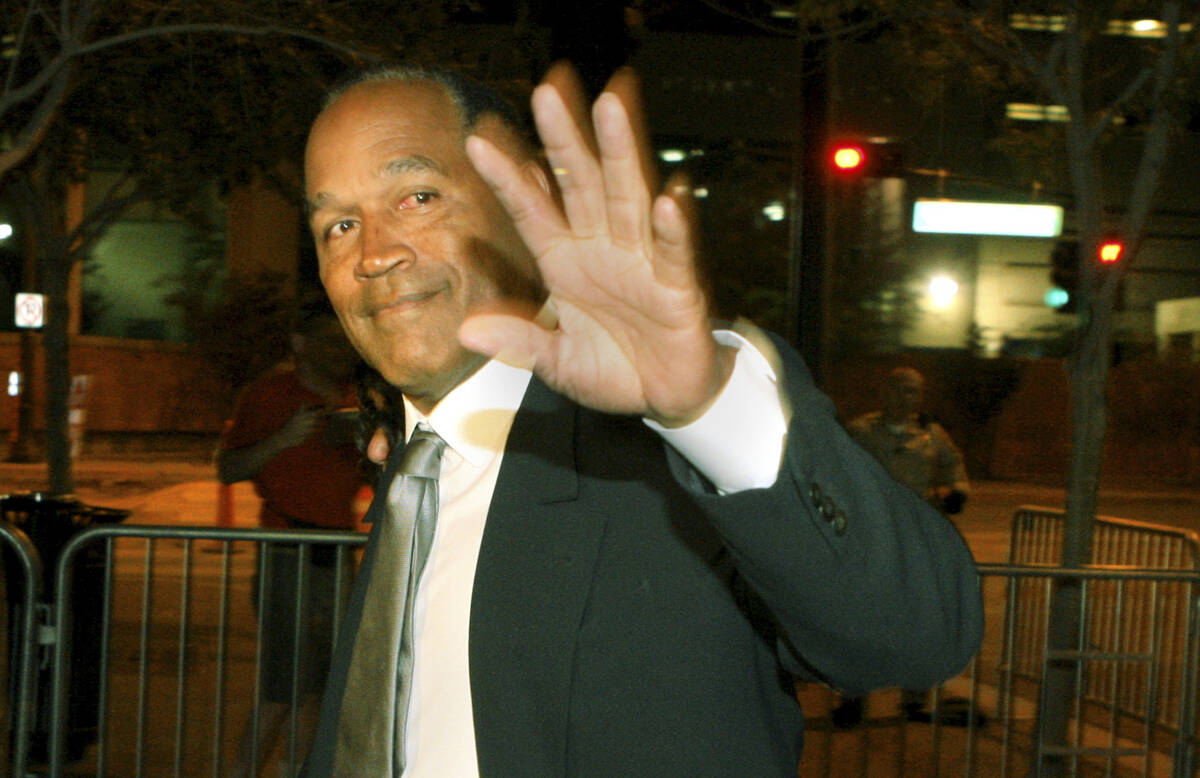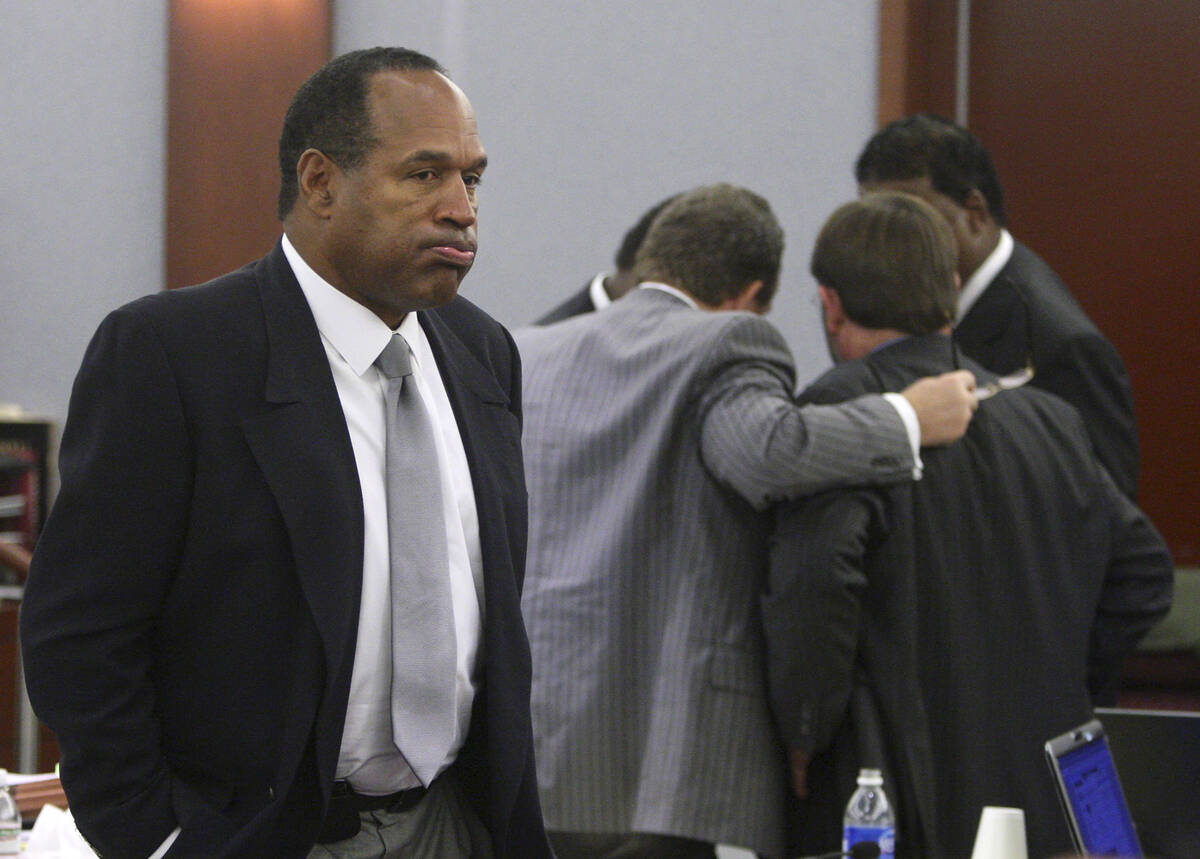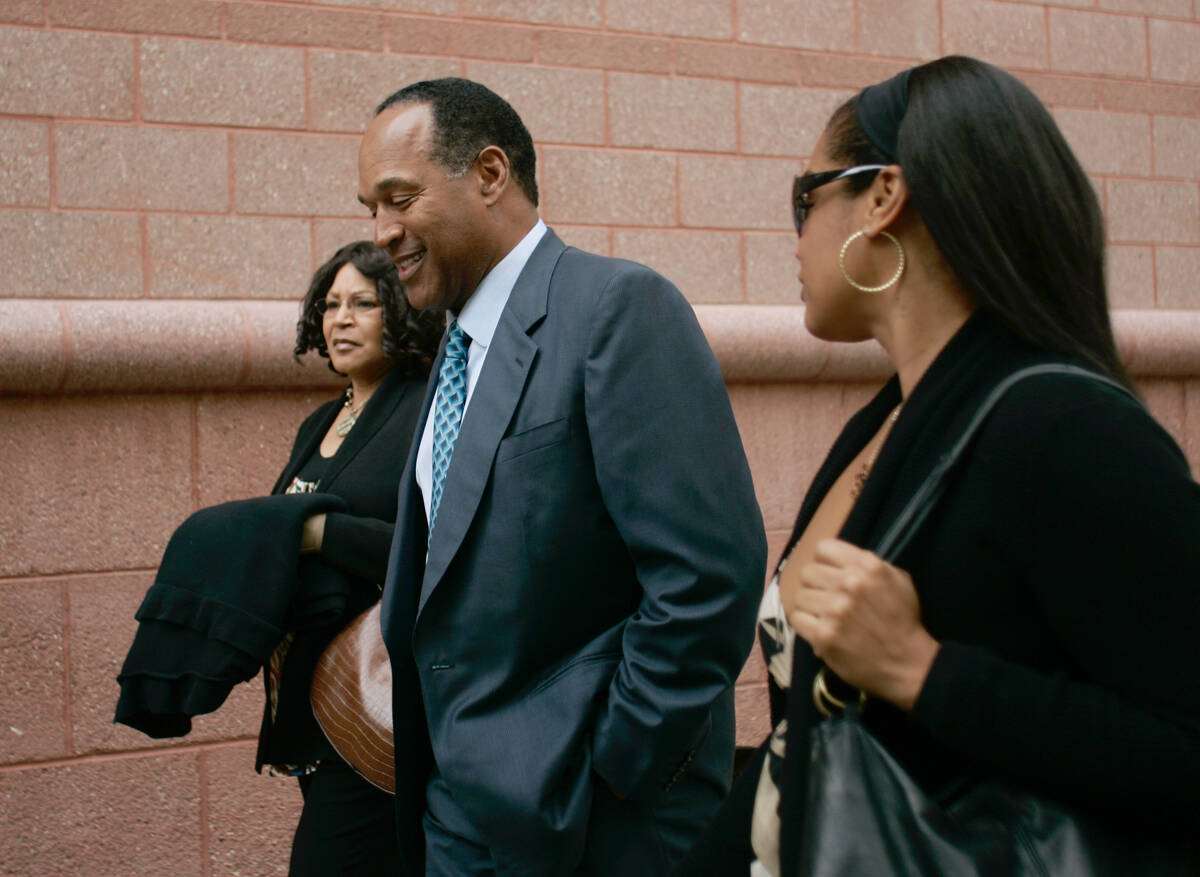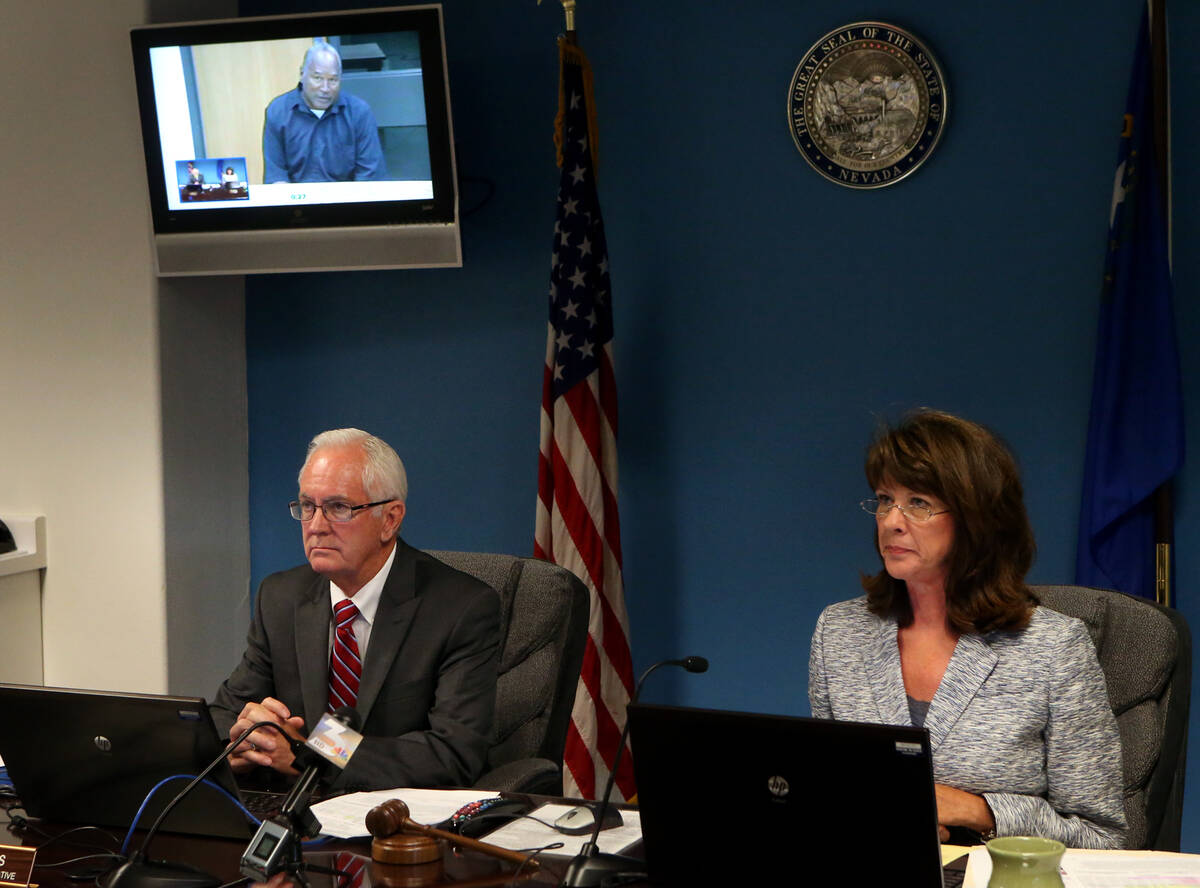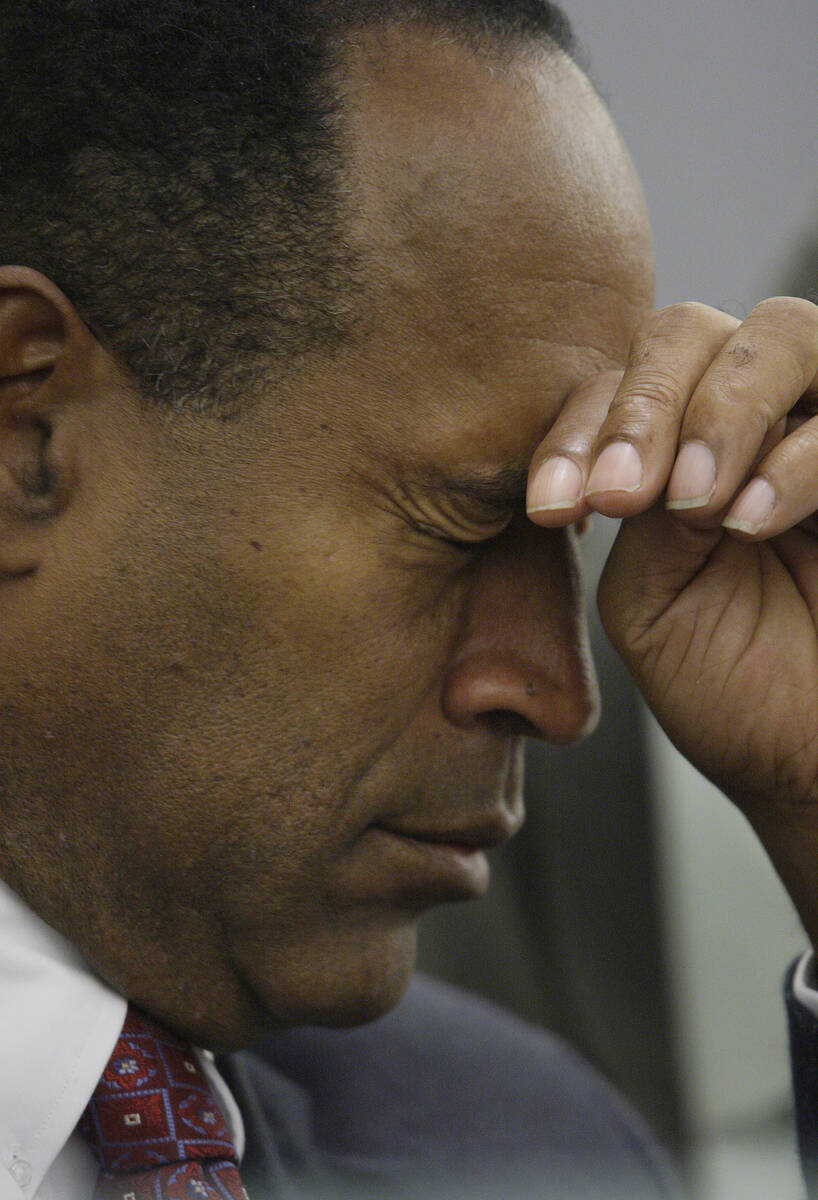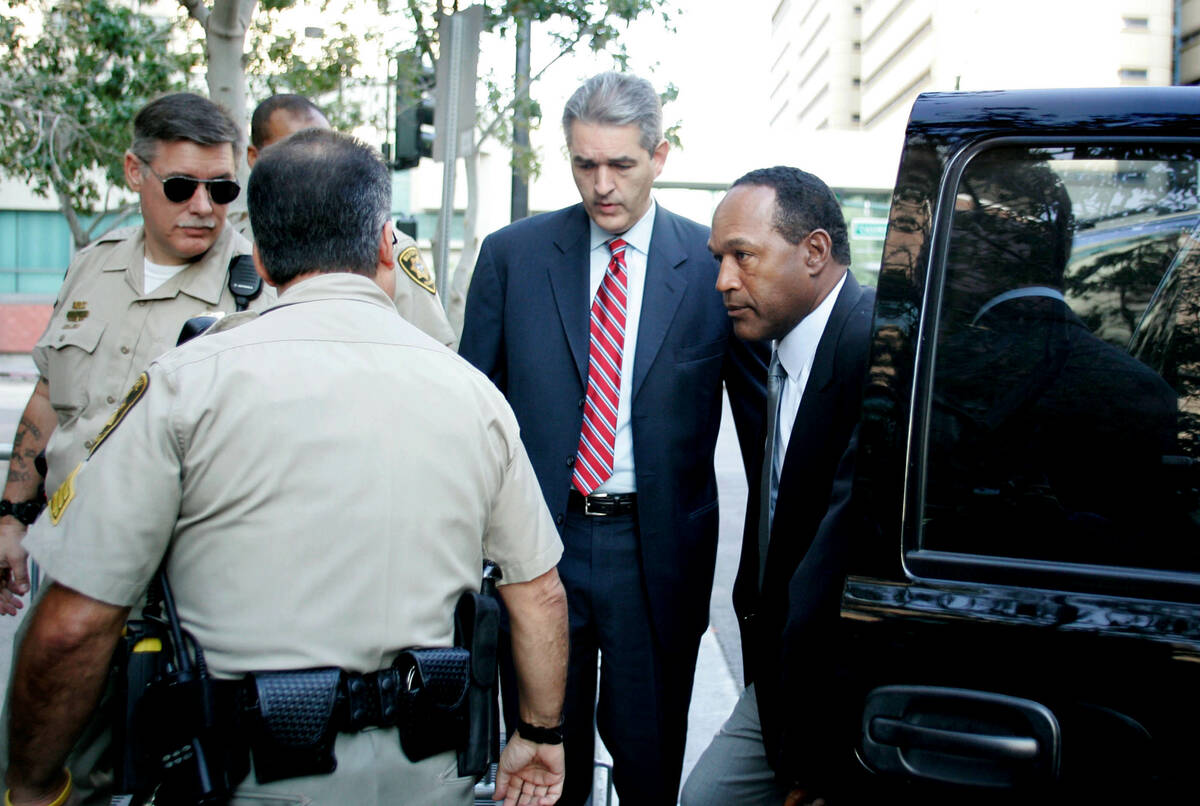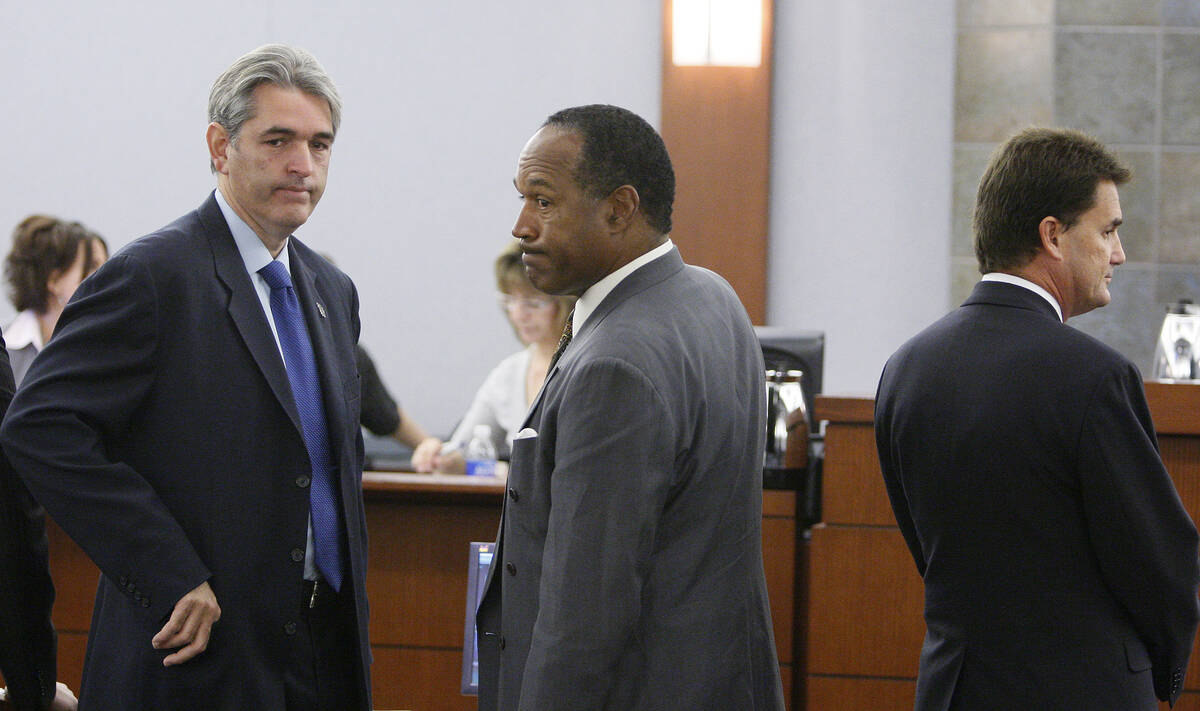O.J. Simpson dies in Las Vegas at 76 after cancer battle
O.J. Simpson, the Hall of Fame football player who was acquitted of the murders of his ex-wife and her friend in one of the most notorious trials of the 20th century, and was later incarcerated in Nevada for an unrelated robbery, has died of cancer. He was 76.
His family announced his death Thursday morning in a post on X. The Associated Press reported he died Wednesday of prostate cancer.
In a statement later Thursday morning, Clark County confirmed that Simpson died in Las Vegas, where he had resided since his release from prison and had become a fixture in the Summerlin area. Simpson had been living in Las Vegas since he was paroled in 2017 for a 2007 robbery, when he went to take back sports memorabilia from a Palace Station hotel room that he said was stolen from him.
“He was always out in public, especially up here in Summerlin,” said former Clark County District Attorney David Roger, who prosecuted Simpson in the robbery case. “I suspect he probably went out every night. People kind of got used to seeing him in the Summerlin area.”
Clark County officials said the coroner’s office would not be providing information on Simpson’s death.
“Whenever a decedent is in the care of a doctor and dies of natural causes, it’s not reported to the coroner’s office and the office has no jurisdictional authority to investigate,” Clark County said.
Simpson had been living in the spotlight for the majority of his life, first as a well-known football star and actor, then as the man accused of brutally killing Nicole Brown Simpson and her friend, Ronald Goldman, in June 1994. The monthslong, highly publicized “Trial of the Century” in Los Angeles ended with a jury acquitting Simpson of both murders.
The trial has stayed in the public’s collective thought for nearly 30 years, and has been the subject of numerous books and documentaries. Defining moments from the televised case have helped shape the subsequent decades, from the police chasing Simpson down a Los Angeles highway in his white Ford Bronco, to the widespread use of DNA in criminal trials, and the infamous quote: “If it doesn’t fit, you must acquit,” from defense attorney Johnnie Cochran.
In 1997, Simpson was found liable in a civil wrongful death lawsuit, and was ordered to pay millions in damages to the families of Goldman and Nicole Brown Simpson. A undated letter written by Nicole Brown Simpson was introduced as evidence in the wrongful death trial, in which she wrote that Simpson “beat the holy hell” out of her the year after she was pregnant.
His trouble with the law continued in 2000, when a traffic altercation in Miami led to Simpson facing battery and theft charges. He was also found not guilty in that case.
Robbery trial
Simpson didn’t become associated with Las Vegas until 2007, when he was found guilty of confronting sports memorabilia dealers in September with a group of five other men in a Palace Station guest room. He was sentenced to spend nine to 33 years behind bars for the robbery, and was released from the Lovelock Correctional Center in Northern Nevada in October 2017.
When Simpson was released, the Las Vegas Review-Journal reported that his parole would include curfew, theft counseling and permission for officers to inspect his home. In 2021, the Nevada Board of Parole Commissioners granted him an early discharge from parole.
“Mr. Simpson is a completely free man now,” Malcolm LaVergne, Simpson’s lawyer in Las Vegas at the time, said when he was granted the early release. LaVergne could not be reached for comment Thursday.
‘It was never personal’
In a phone interview with the Review-Journal on Thursday, Roger said that Simpson’s murder trial “never came into play” in Roger’s mind during the Las Vegas robbery proceedings.
“From my perspective, it was never personal, it was business,” Roger recalled. “He committed a robbery in Las Vegas, he had an opportunity to plead guilty and get a lesser sentence. He chose to roll the dice at trial.”
Attorney Gabriel Grasso, who served as Simpson’s local counsel during the robbery trial, said he believed the murder conviction was intrinsically tied to the robbery case. Even the day that jurors convicted Simpson — on Oct. 3, 2008 — was exactly 13 years after Simpson was found not guilty of murder.
“He got the book thrown at him,” Grasso told the Review-Journal in a phone interview Thursday.
Grasso said he hasn’t maintained a friendship with Simpson past the 2008 robbery conviction. But his memories of Simpson was that of a friendly man who was taken advantage of when it came to the robbery charges. Defense attorneys had argued at trial that instead of orchestrating a robbery, Simpson stormed into the hotel room in order to recover stolen property.
A recording from the crime scene captured Metropolitan Police Department forensic investigators saying: “L.A. didn’t get him, but we’re going to get him,” Grasso remembered.
“To me, that set the tone for the whole case,” he said.
‘He knew how to turn it on’
Meanwhile, Roger said that prosecutors argued Simpson ordered the robbery, and told co-conspirators to bring guns to the hotel room. Roger recalled that although Simpson presented a friendly face in public — frequently taking photographs and signing autographs in the courthouse hallways — he was also known to have a temper.
“He was charismatic, no question about it,” Roger said. “He knew how to turn it on, and he knew how to turn it off.”
Roger recalled one time when he ran into Simpson on a golf course after he was paroled. Simpson called him by name, and said: “Don’t prosecute me for what I’m about to do.”
The man standing next to Simpson chimed in, telling Roger, “Yeah, O.J. says he’s going to kill us on the golf course,” Roger recalled.
Roger said he just shook his head and went about his business.
In 2017, Simpson filed a defamation lawsuit against a Strip resort accusing it of telling a celebrity news site that he had been banned for being drunk and disruptive.
Attorneys for The Cosmopolitan of Las Vegas argued that Simpson could not be defamed because his reputation was already tarnished. The case was settled in 2021 on terms that were not disclosed.
Football history
Born in San Francisco in 1947, Simpson starred on the football field at City College of San Francisco before transferring to the University of Southern California, where he rose to prominence as a two-time All-America running back. After winning the Heisman Trophy in 1968 as the most outstanding player in college football, Simpson was selected by the Buffalo Bills with the No. 1 pick in the 1969 NFL/AFL common draft.
Simpson’s pro football career started slowly, but following a coaching change in Buffalo, he went on to lead the NFL in rushing four times in five seasons from 1972 to 1976. He was the first player in league history to rush for more than 2,000 yards in a season while winning the Most Valuable Player award in 1973, then set an NFL single-season record with 23 total touchdowns in 1975.
Simpson played 11 seasons with the Bills and San Francisco 49ers, retiring in 1979 as the second-leading rusher in NFL history. Nicknamed “Juice” as a play on his initials, Simpson made the Pro Bowl six times and was named first-team All-Pro each season from 1972 to 1976.
In addition to being inducted into the College Football Hall of Fame (1983) and Pro Football Hall of Fame (1985), Simpson was named to the NFL All-Decade Team of the 1970s, the NFL 75th Anniversary All-Time Team and the NFL 100 All-Time Team.
Following his retirement from football, Simpson pursued an acting career and was cast in “The Naked Gun” film trilogy along with several other roles. He served as the pitchman in television commercials for Hertz Car Rental and also worked as a commentator on “Monday Night Football” for three seasons from 1983 to 1985.
In recent years, Simpson frequently posted videos of himself on X discussing football. A video from Feb. 11 showed him in a 49ers jersey, incorrectly predicting who would win the Super Bowl in Las Vegas.
Following up on a previous video where he denied being in hospice care, Simpson said his “health is good.”
“Obviously, I’m dealing with some issues,” he said. “But, hey, I think I’m just about over it, and I’ll be back on that golf course hopefully in a couple of weeks.”
It was the last video Simpson ever posted.
Contact Katelyn Newberg at knewberg@reviewjournal.com or 702-383-0240. Review-Journal staff writer David Schoen, director of social media Caitlin Lilly and The Associated Press contributed to this report.
RELATED
OJ on trial in Las Vegas — PHOTOS
Key events in OJ Simpson's fall from sports hero and movie star
O.J. Simpson's conflicting, curious Las Vegas life



